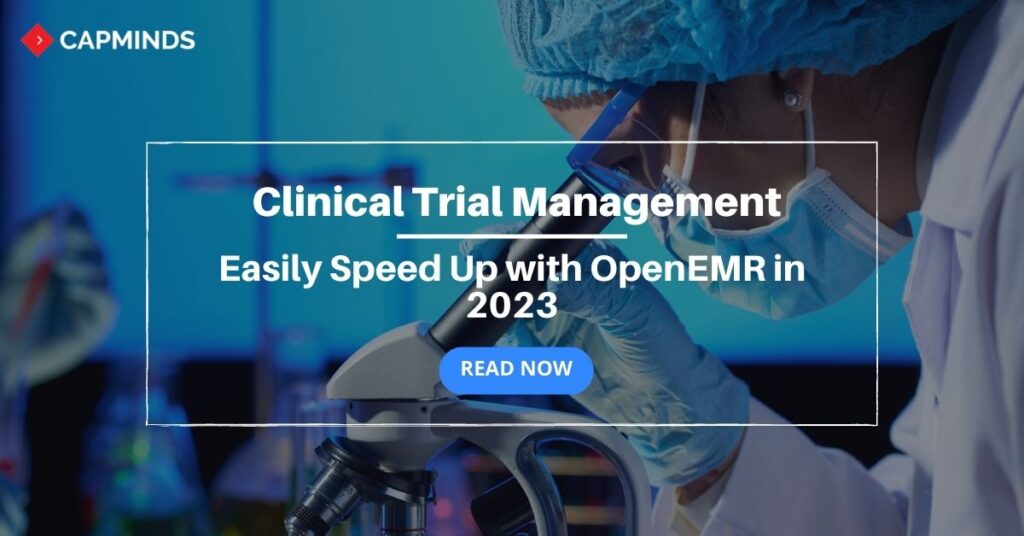Easily Speed Up Clinical Trial Management with OpenEMR in 2025
OpenEMR is an open-source electronic medical record (EMR) system that is primarily designed for ambulatory care settings.
While it can be used in various healthcare environments, including clinics and hospitals, it is not specifically designed to handle the specific requirements of managing clinical trials, yet it helps.
Clinical trials involve complex protocols, data collection, regulatory compliance, and reporting requirements. Therefore, specialized clinical trial management systems (CTMS) are typically used to streamline and manage the entire process. These systems are specifically designed to address the unique needs of clinical trials.
However, if you are looking to leverage OpenEMR for certain aspects of clinical trial management, it may be possible to extend its functionality or integrate it with other tools.
RELATED: Can large clinics use OpenEMR? [Top 8 challenges & shotgun solutions]
A Few Potential Use Cases
1. Patient Management
- OpenEMR can be used to manage patient demographics, medical history, and visits during a clinical trial
- You can adapt the system to include additional data fields specific to the trial or create custom forms for data collection
RELATED: Top 10 Roles of OpenEMR in Improving Health Information Exchange
2. Study Documentation
- OpenEMR can be used to store and manage study-related documents like informed consent forms, protocols, and investigator brochures
- These documents can be associated with specific patients or trials
3. Visit Scheduling & Tracking
- OpenEMR’s scheduling capabilities can be utilized to manage visit schedules for trial participants
- It can help track upcoming visits, monitor visit completion, and generate alerts for missed visits
4. Adverse Event Reporting
- OpenEMR can be extended to include modules for capturing and reporting adverse events during a clinical trial
- This would require customization to meet regulatory reporting requirements
It’s important to note that using OpenEMR for clinical trial management may require significant customization, development, and adherence to regulatory guidelines.
Advantageous Essentials of OpenEMR for Clinical Trial Management
1. Customization
- OpenEMR is an open-source platform, which means it can be customized and extended to meet specific requirements
- To adapt OpenEMR for clinical trials, you would need to modify the system to include additional data fields, forms, and workflows that are specific to the trial protocols and data collection needs
2. Data Management
- OpenEMR can handle data management tasks like capturing patient demographics, medical history, and clinical data
- However, for clinical trials, you would need to extend the system to include additional data elements relevant to the study like inclusion/exclusion criteria, adverse events, concomitant medications, laboratory results, and other trial-specific data points
3. Integration
- OpenEMR can be integrated with other systems and tools commonly used in clinical trials
- For example, you could integrate it with a clinical trial management system (CTMS) or electronic data capture (EDC) system to streamline data entry, monitoring, and reporting processes
4. Regulatory Compliance
- Clinical trials are subject to strict regulatory requirements like Good Clinical Practice (GCP) guidelines and the International Conference on Harmonisation (ICH) guidelines
- If you plan to use OpenEMR for clinical trials, you would need to ensure that the system adheres to these regulations
- This may involve implementing appropriate security measures, audit trails, and data encryption to protect patient privacy and maintain data integrity
5. Reporting and Analytics
- OpenEMR can generate basic reports on patient demographics, visit history, and clinical data
- However, for clinical trials, you would likely need to develop custom reporting capabilities to extract trial-specific data and generate reports required for monitoring, regulatory submissions, and data analysis
6. Training and Support
- Implementing OpenEMR for clinical trials would require training for the study team on how to use the system effectively and ensure data accuracy
- Additionally, you may need to consider ongoing technical support and maintenance to address any system issues or updates that arise during the trial
Final Thoughts
It’s important to note that while OpenEMR can be customized for certain aspects of clinical trial management, it may not provide the comprehensive functionality and regulatory compliance required for managing the entire lifecycle of a clinical trial.
Therefore, it’s crucial to assess your specific needs and consult with experienced developers and compliance experts in clinical trial management systems to determine the best approach for your trial.
OpenEMR Services from CapMinds
CapMinds OpenEMR consigns clinicians with the best features and ways to integrate. It makes their workflows more efficient and filtered. The integrated features will allow them to combine the ability of patient record management with conceptual and concurrent reminders. This enhances the process of decision-making and improves patient care and quality.
Get the best technologies and HIPAA-compliant and efficient OpenEMR that can be tailored to fit your practice from CapMinds Technology. Our OpenEMR services facilitate a Modern User Interface (UI), customization, production support & training. Also facilitates billing, report & specialty enhancements, clearing house integrations, e-prescription, cloud, and more.
“Get the proven and perfect professional support for your OpenEMR”




